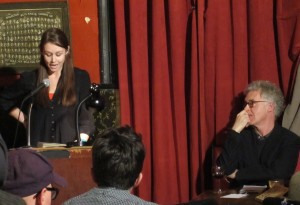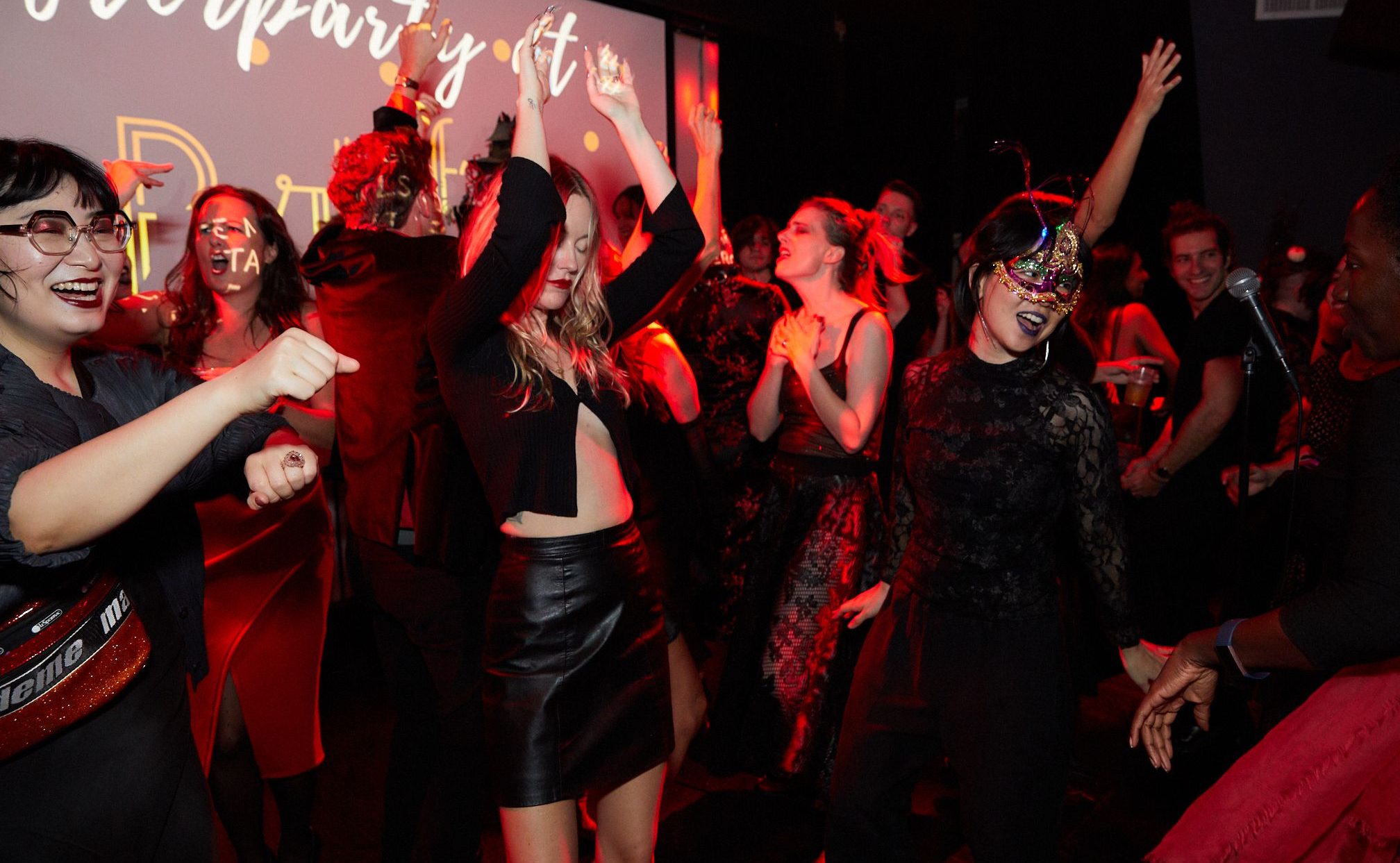news
Nathan Englander’s Serious Moral Act

1. I’m not sure if this photo does the crowd justice, but let me tell you — Greenlight was packed. 2. The two litstars and friends, in conversation.

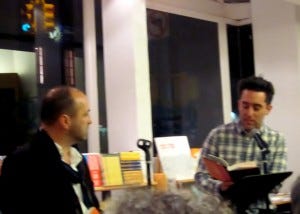
I got to Greenlight a few minutes after seven last night, thinking that would give me plenty of time to find a seat for Nathan Englander’s reading from his new collection, What We Talk About When We Talk about Anne Frank: Stories, and subsequent talk with Colum McCann. But I was wrong. It was already standing room only, so crowded that even book browsing was difficult. Dammit, I thought. Where was I supposed to put my gigantic bag, heavy with my laptop? Where was I supposed to take notes? And then a ray of sunshine: someone got up, and I pounced. (Yeah, I was that girl who took that seat in the second row while the rest of you glared. Sorry. Also, thank you to the gentleman who let me take his wife’s seat while she attended to their child. You’re awesome!)
The crowd made sense, though… Brooklyn really does love its writers, and its Jews. And with two writers as iconic as both Englander and McCann — really, how could any normal person hope for a seat?
1. One of the many reasons why Greenlight is an awesome bookstore: The literary magazine selection. Note EL #6 in the bottom left, featuring none other than Nathan Englander. 2. Writers supporting writers: A very intense John Wray, & Myla Goldberg. 3. Andrew Tolve, a writer who is new to Brooklyn by way of Ecuador and Paris. He’s excited to get into all the literary madness that makes up life here.

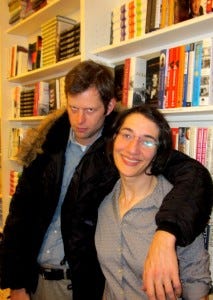
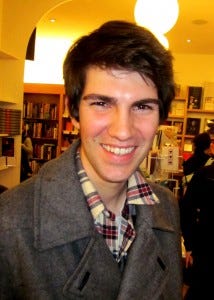
The evening began with Englander reading for “exactly four minutes” from “Free Fruit for Young Widows,” which, to use Englander’s words, was published in The New Yorker and is “about Jews.” And then it was on to the discussion part of the evening. First topic, the “elephant in the room”: The book’s title. McCann didn’t like it and fought with Englander, trying to get him to change it while the book was in manuscript form, but he’s since come around. “This is when I decided I had to own it,” Englander said. His agent told him to take his stand early, and know that everyone would say ‘this book is ruined.’ But as McCann said: “I thought the Carver story was too iconic. But this collection is an iconic one. It will move that title.”
“Well, it’s not like I called it The Cat Ate My Yarmulke or something. It’s not random,” Englander explained. “My story is laid over Carver’s. It’s just that love is replaced with the holocaust.”
1. Mr. Fancy Pants himself. (This is what McCann’s kids refer to Englander as.)
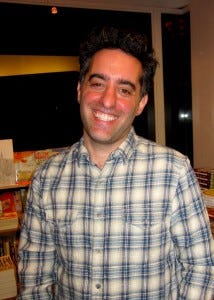
The conversation moved to Englander’s obsession with the Chosen Ones. Writing fiction is about “becoming comfortable with your own head,” he said. There’s tics, which one should hunt “like the devil,” he explained, and then there’s themes. If a writer finds themselves constantly writing about the same themes, they should just go with it. Every story’s been done before a thousand times, anyway, so own it, and make it yours. “If I’m just nutty for Nazis, then that’s what I’ll write about.” That’s right, you heard it here first, guys: Nathan Englander is just nutty for Nazis.
From here, McCann and Englander began to more seriously discuss craft. “All of us who write are sick with the same disease,” Englander said. “We’ve been infected by books, and now we must infect others.” He talked abut writing as a “controlled form of psychosis,” and how “96% of it is sitting down and engaging with the emotions.” And the best way to write that book in your head? Act like Nike, and Just Do It. “If you think that book in your head might be the Great American Novel or whatever, it really might be,” he said.
This is when things really began to get good. Englander said something about a “third consciousness” (“Boy, am I getting soft,” he remarked), and this is what we must tap into when we write. “Something happens in all that sitting down and torturing yourself,” he said. For example: if we don’t know what’s going to happen in our story on Friday, and then suddenly it reveals itself to us on Sunday, then something was happening, whether we realized it or not. “It’s still your own head,” he added. “Something was cooking in there.”
“Right,” McCann agreed. “It’s like an equation, with multiple variables, and none of them are fixed, but if any are wrong then it will not work.”
1. Past students of both McCann and Englander at Hunter College’s MFA Program: Bill Cheng (Class of 2010) and Sarah Goffman (2011). 2. McCann with fellow Irishmen Johnny Kelly, who is the author of Banjaxed.
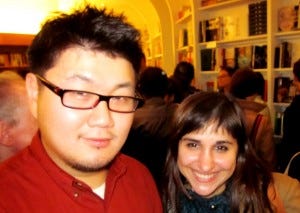
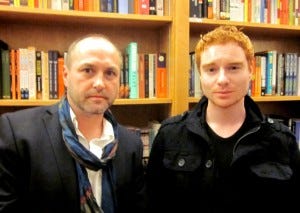
We then moved on to the moral obligation of writing fiction, prompted by Jonathan Franzen’s blurb on the back of the collection, which calls it an “exceptional combination of moral humility and moral assurance.” Englander emphatically agreed that writing fiction is a “serious moral act.” But don’t get him wrong — fiction writers tend to be “horrible, drunken people” to whom one should not lend money. They’re moral people, who tend to do horrible things. My inner writer wept a tear of solidarity. These were my people. We are the Chosen Ones.
Right before the Q&A, Colum McCann wondered about the niceness that is going around modern writers. “Where are all the fist fights?” he asked. “Are we afraid?”
“We’re fearless,” Englander replied.
“Are we irrelevant?”
“Fuck irrelevance,” he said. “I’m scared of everything in this world except for how important fiction is.”
And with a quote like that, standing in a crowded bookstore suddenly seemed so worth it.
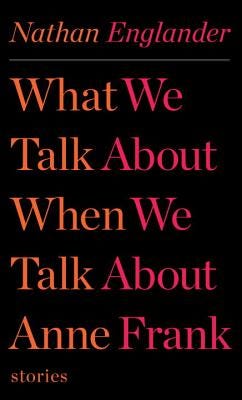
What We Talk About When We Talk About Anne Frank, by Nathan Englander
***
–Julia Jackson is a fiction writer and the editor of Electric Dish. Find her on the internet here.





